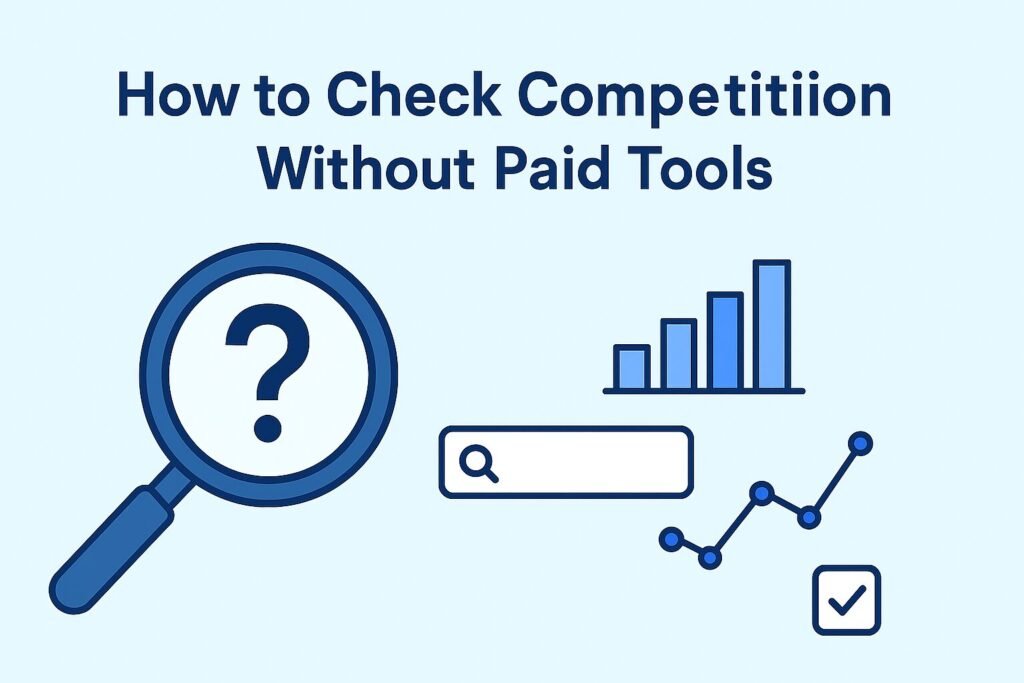If you are new to blogging or digital marketing, chances are you have already heard the phrase “keyword research.” It’s one of the most critical skills for ranking on Google.
But here’s the problem: most keyword tools are paid and expensive. Subscriptions for tools like SEMrush, Ahrefs, or KWFinder cost anywhere between $99 to $199 per month, which is not realistic for beginners.
So, does that mean you can’t do keyword research without these tools? Absolutely not.
In fact, if you learn the right techniques, you can find low competition keywords without spending a single rupee. This guide will show you exactly how to do that.
According to Zapier, When done right, the best keyword research tools simplify and streamline your workflow—they make it easier to find the right keywords to target and give you the data you need to actually rank for them. But they shouldn’t require you to empty out your bank account and sell your first-born child in order to access that data.
We will go step by step, with practical examples and easy-to-follow strategies. By the end, you’ll be able to build a list of profitable low competition keywords that can help your website rank faster.
What Are Low Competition Keywords?

Low competition keywords are search phrases that have less competition in Google’s search results.
These are often long-tail keywords (queries with three or more words) that represent very specific search intent.
For example:
- Competitive keyword: “Yoga”
- Low competition keyword: “Best morning yoga stretches for beginners”
Clearly, the second keyword is more detailed and targeted. It will have fewer competitors, which means you have a higher chance of ranking for it.
Low competition keywords usually don’t bring millions of searches per month, but they bring highly targeted traffic. And that’s what matters. Because traffic that converts is more valuable than traffic that doesn’t.
Why Low Competition Keywords Matter for Beginners
When you start a new website or blog, it has little to no authority in the eyes of Google. Competing against established websites for competitive terms like “weight loss” or “digital marketing” is almost impossible.
But Google is fair in one way: if you publish helpful content around specific, less competitive queries, you can still rank even as a beginner.
Think of low competition keywords as stepping stones. Ranking for them builds your site’s trust and authority over time. Once your site grows stronger, you can target more competitive keywords later.
So if you want to see traffic and results quickly, low competition keywords should be your starting point.
Free Methods to Find Low Competition Keywords

Now let’s get into the actual process. Here are the top free methods you can use right now.
1. Google Autocomplete
When you start typing something into Google, the search box instantly suggests terms. These suggestions are based on what people are actually searching.
For example:
Type “best diet for” and Google will suggest things like:
- best diet for weight loss after pregnancy
- best diet for PCOS
- best diet for diabetes patients
Each of these suggestions is a potential keyword idea.
👉 Pro tip: Add alphabets after your phrase. Type “best diet for a…” then “best diet for b…” and so on. This gives you a huge list of ideas straight from Google itself.
2. People Also Ask (PAA) Box
Whenever you search on Google, you’ll often see a section called “People Also Ask.” These are questions that real people are typing into Google.
For example, search for “keto diet” and you might see questions like:
- Is keto diet good for beginners?
- How much weight can you lose on keto?
- Is keto safe long term?
Each question can be turned into a blog post title or at least a section of your article.
👉 Pro tip: Keep clicking the dropdown questions inside PAA. The more you click, the more related questions Google keeps showing you.
3. Related Searches at the Bottom of Google
Scroll to the bottom of Google’s search results page and you’ll see “Related searches.”
For example, if you search for “content marketing tips,” related searches might include:
- content marketing strategy examples
- content marketing for small business
- content marketing without blogging
These are keywords that Google thinks are closely connected. That means people are searching for them.
👉 Pro tip: Combine related searches with autocomplete to create clusters of keywords. This helps you write comprehensive content that ranks for multiple terms.
4. Google Trends
Google Trends is a free tool that shows how search interest changes over time.
For example, if you type “home workouts,” you can see whether the trend is rising or declining. You can also discover related topics and queries that are currently trending.
👉 Pro tip: Always choose “Rising” queries inside Google Trends. These are search terms gaining popularity, and most of them will have very little competition.
5. Answer the Public (Freemium Tool)
Answer the Public takes a keyword and turns it into hundreds of questions.
For example, type “digital marketing” and it will generate questions like:
- digital marketing for beginners
- digital marketing vs traditional marketing
- digital marketing jobs without degree
Even with the free version, you can get plenty of ideas.
6. Reddit & Quora
People ask thousands of questions on Reddit and Quora every day. Many of these are keyword opportunities waiting to be used.
For example, go to Quora and type “blogging.” You’ll see questions like:
- How do beginners start blogging?
- Can I make money blogging in 2025?
- What are some low-cost blogging niches?
These are real user questions that you can turn into content ideas.
👉 Pro tip: Look for questions with multiple answers and high engagement. That shows real demand.
7. YouTube Search Suggestions
YouTube is the second biggest search engine after Google. And its autocomplete feature is just as powerful.
For example, type “how to cook rice” and you’ll see suggestions like:
- how to cook rice without cooker
- how to cook rice perfectly every time
- how to cook rice in microwave
These keywords work well not just for YouTube videos but also for blog articles.
8. Free Chrome Extensions (Keywords Everywhere – Limited Free Data)
Keywords Everywhere is a freemium Chrome extension. Even in the free version, it shows related keywords and “People also search for” suggestions when you type something in Google.
While you won’t get exact search volume numbers without paying, you’ll still discover a lot of keyword ideas.
How to Check Competition Without Paid Tools

Finding keywords is one thing. But how do you know whether they are low competition?
Here are some free methods.
1. Analyze the First Page of Google
Type your keyword into Google and look at the top 10 results.
Ask yourself:
- Are they big authority sites like Healthline, Forbes, HubSpot? If yes, it may be tough.
- Do you see forums, Quora answers, or small blogs ranking? If yes, you have a chance.
If smaller sites are ranking, it usually means low competition.
2. Use Allintitle Operator
Go to Google and type:
allintitle:"your keyword"
This shows how many pages have that exact keyword in their title.
For example, allintitle:"best diet for PCOS" might return only 300 results, while allintitle:"weight loss" shows millions.
The lower the number, the less competition.
3. Check Search Volume with Free Tools
While exact numbers require paid tools, you can get a rough idea with:
- Google Keyword Planner (free with a Google Ads account)
- Ubersuggest free version (limited daily searches)
- Keyword Surfer Chrome extension
Even if you only get ranges like “1K – 10K searches,” it’s enough for beginners.
How to Choose the Best Low Competition Keywords

When you have a list of keywords, use these filters to choose the best ones:
- Relevance – Does it match your niche and audience?
- Search Intent – Is the keyword informational, transactional, or navigational?
- Competition – Are smaller blogs ranking, or only giants?
- Volume vs. Effort – Sometimes even 100 monthly searches are worth it if competition is very low.
Remember, you don’t need to chase high numbers. Even if you rank for 30–40 small keywords, combined they can bring thousands of visits.
Writing Content That Ranks for Low Competition Keywords
Finding the keyword is only half the job. To actually rank, you need to create quality content.
Here are some tips:
- Use the keyword naturally in the title, URL, and first paragraph.
- Answer the question directly and simply at the beginning.
- Use H2 and H3 headings with related keywords.
- Add FAQs inside your article (Google loves this for voice search).
- Write in short paragraphs (like this one) for readability.
- Include images, lists, and examples to make it engaging.
Most importantly, focus on helping the reader, not stuffing keywords.
Voice Search Optimization with Low Competition Keywords

Voice search is growing fast. People are asking Google questions like they talk to a friend.
For example, instead of typing “best shoes running,” they ask:
- “What are the best running shoes for flat feet?”
- “Which running shoes are good for beginners under ₹2000?”
This is why long-tail, question-based keywords are so powerful.
To optimize for voice search:
- Use conversational titles like “How to…” or “What is…”
- Answer in short, direct sentences (so Google can pull your content for Featured Snippets).
- Add a FAQ section with natural-sounding questions.
Common Mistakes Beginners Make in Keyword Research
- Only targeting high-volume keywords – which are too competitive.
- Ignoring search intent – writing articles that don’t match what users want.
- Not checking SERP competition – blindly choosing keywords without looking at who ranks.
- Keyword stuffing – overusing keywords instead of writing naturally.
- Not clustering keywords – writing one post per keyword instead of covering a topic fully.
Avoid these mistakes and you’ll be way ahead of most beginners.
Final Thoughts
You don’t need expensive tools to do keyword research. With just Google search, trends, and free tools, you can discover plenty of low competition keywords.
The key is to focus on specific, long-tail, conversational queries that bigger sites often ignore.
Start small, build authority, and over time, you’ll be able to target more competitive terms.
Consistency matters more than anything else. Do this regularly, publish high-quality content, and you’ll start seeing organic traffic growth.
FAQs on Low Competition Keyword Research
Q1. Can I really do keyword research without paid tools?
Yes, you can. Google autocomplete, People Also Ask, related searches, Quora, and free tools like Google Trends are more than enough for beginners.
Q2. How do I know if a keyword is low competition?
Check the first page of Google. If small blogs or forums are ranking, it’s low competition. You can also use the “allintitle” operator for a quick check.
Q3. Are low competition keywords worth it if they have low volume?
Absolutely. Even 100 monthly searches can be valuable if competition is low. Multiple low-volume keywords combined can bring large traffic.
Q4. How many keywords should I target in one blog post?
Ideally, 1 main keyword and 3–5 related long-tail keywords. This helps you rank for multiple variations.
Q5. Is keyword research still important in 2025?
Yes. Even with AI search growing, Google still relies on keywords to understand content. Low competition keywords will remain your best entry point.
